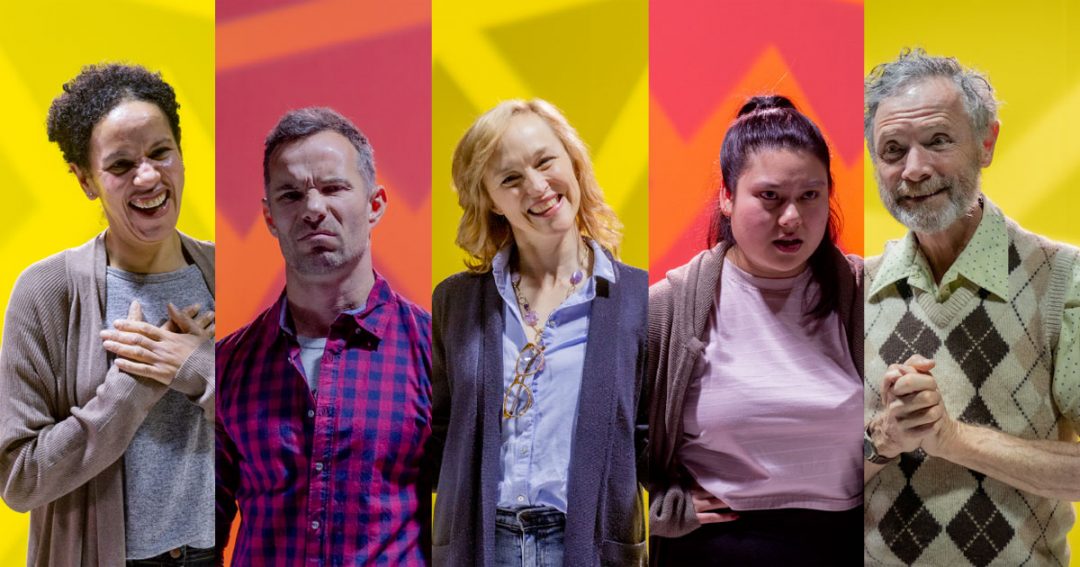With Eureka Day billed as the “hottest new comedy sensation coming out of New York”, the bar was set high by the State Theatre Company of SA’s publicists.
Happily, the bar was not only cleared but cleared by some distance, thanks to a genius collection of characters and some marvellous scenarios; one of which resulted in a sustained, rolling roar of laughter for at least 15 minutes.
This play is set at Eureka Day School in Berkeley, California, where the unbearable weight of wokeness keeps the well-meaning, authentically virtue-signalling school committee engaged in much busy work and awkwardly-genteel debate throughout the year. Until there is a mumps outbreak. Through this device, playwright, Jonathan Spector, scrapes aside the thin veneer of privileged tolerance to reveal the despairingly chaotic breeding ground of conspiracy theories and passionately-embraced pseudoscience.
In a master act of precognition, not only did Spector write this “timely” play before Covid-19, but State Theatre’s Artistic Director, Mitchell Butel, had selected it three months before the virus wreaked havoc on the world and reignited debate about vaccination. And that is what works so well about this production. Humankind’s development of effective vaccines in the fight against Covid, gives the play timeliness. But the underlying theme of what happens when people disengage themselves from scientific rigour and critical thinking with broadcast tools available to every hack and crank, sadly means this play is going to remain relevant while this age of social media ubiquity continues.
What makes this play worth fitting into your busy, end-of-year schedule? Not only is it a meticulous and comedic observation of a community’s earnest but deeply-flawed struggle to be enlightened, but it has been perfectly cast. Every player on the stage carries this story, embodies it, lives it, and holds to playing their roles in truth, even in some of the most outlandishly zany scenes.
On an expansive set that captures the essence of “schoolness” (bravo to Meg Wilson and the State Theatre workshop), we first meet the school council, being “led” by the ever-careful and deep-breathing Don (Glynn Nicholas) and his right hand person, Suzanne (Caroline Craig). In the opening scene, young father, Eli (Matt Hyde), politely rides roughshod over other female members of the council (while all the time apologising for doing so), especially young mum, Meiko (Juanita Navas-Nguyen), and new council member, Carina (Sara Zwangobani).
In the midst of this first, earnest debate we witness cracks in the woke manners and protocols, especially as we note Suzanne’s unintentionally-spoken assumptions about Carina’s status; being a person of colour, it is assumed her child must be at the school through some sort of subsidy or scholarship.
Spector hones in on the achingly-awkward twisting of thoughts, often mid-sentence, as our councillors attempt to state their positions gently, constantly reading the room and smoothing off any potentially rough edges. They try, at once, to be steadfast and accommodating. As dysfunctional as this council of five appears to be, when they hold a virtual community meeting, the torrent of online comments uproariously shows how broken this microcosm of society really is. The wall of projected comments charts the inevitable slide from minor bickering between participants to passive aggression to exaggeration to straw manning and ultimately to at least one Nazi comparison (par for the course in most online conversations).
Every actor shines in this production. Craig’s picture perfect heroine is exquisitely patronising and shifts gears poignantly when her character is left with little option other than to bare her family secrets to explain her position. Likewise, Hyde captures the depth of a character who could easily be played as a cardboard-cutout, token white male, especially in a powerful opening to Act 2, in which his portrayal of grief and inner conflict is sublime. Navas-Nguyen rides the swings and roundabouts of her character’s trajectory, sizzling in playful moments and exploding in others. Zwangobani holds true to her character’s course in a beautifully-paced journey from the kowtowing newbie to the exasperated outsider who is astonished by the insular thinking within this fringe school’s thought bubbles (although, “thought” might be a term too generous). And Nicholas returns to the main stage with a role that seems to have been written for him; deferential, ever-mediating and massaging, and smitten by mime. Director, Rosalba Clemente, lets a little of Nicholas’ trademark mime out to play, much to the delight of older audience members.
A special mention for accent coach, Jennifer Innes, should be made. Innes had the cast deliver their lines with subtle, understated accents of just enough weight to be there but not enough to demand attention.
There are many moments of sheer joy, which is a great feat, given how contentious the topics of discussion are. What could have been a play that preached, instead becomes a play that beseeches us to see the forest for the trees and to accept evidence, even when it’s uncomfortable and might require a change of opinion. Indeed, amid the hilarity, we are shown that not all opinions are equal. We also see that the longer we remain engaged with others, face to face, the deeper we can understand them and at least develop sympathy, if not empathy, for their positions.
Eureka Day is an hilarious yet chilling take on what happens when our grownups and leaders abdicate their responsibility to be clear-thinking adults. It cleverly reveals how polarising, misguided, and patronising we can be, whether are are on the far left or the far right. It’s also a disarmingly, sad, and brilliant time capsule of the current state of lazy, jingoistic, armchair contributors who weigh down and sabotage any efforts to engender thoughtful debate in society. Eureka Day gets full marks for comedy, food for thought, and pure entertainment.
Eureka Day, State Theatre Company South Australia, Dunstan Playhouse, November 12-27, 2021.

